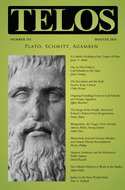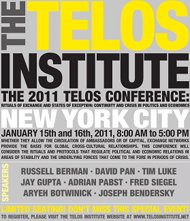Marcia Pally’s “Non-Market Motives at Work in the Market: ‘New Evangelicals’ in Civil Society in the United States and Overseas” appears in Telos 157 (Winter 2011). Read the full version online at the TELOS Online website, or purchase a print copy of the issue here.
 Since the 2008 global financial crisis, a reassessment of our global market system seems to be afoot: if neoliberalism (too much market) yields the Great Recession, if socialist planned markets (not enough market) produce the failed economies of the former Soviet bloc, and if social-market combinations (too much market centralization) progress toward the high-cost and slow growth of Western Europe, what are better options? This essay describes the economic justice efforts of “new evangelicals,” those who have left the right for an anti-consumerist, anti-militarist focus on economic justice, environmental protection, immigration reform, and racial/religious reconciliation. It reviews the history of U.S. evangelicalism, describes the current shift away from the religious right, and details “new evangelical” common-good capitalism, where the benefits of capitalist markets are preserved yet embedded in—and constrained by—common-good values. This is not alms-giving but the restructuring of opportunity for those whom the market has failed—not an undoing of market relations but a radical change of relations within the market. The undergirding religious doctrines and case studies, both domestic and overseas, are described. Against the view that linking markets to common-good principles is romantic or useless, “new evangelicals” are already on the ground, doing just this sort of linking.
Since the 2008 global financial crisis, a reassessment of our global market system seems to be afoot: if neoliberalism (too much market) yields the Great Recession, if socialist planned markets (not enough market) produce the failed economies of the former Soviet bloc, and if social-market combinations (too much market centralization) progress toward the high-cost and slow growth of Western Europe, what are better options? This essay describes the economic justice efforts of “new evangelicals,” those who have left the right for an anti-consumerist, anti-militarist focus on economic justice, environmental protection, immigration reform, and racial/religious reconciliation. It reviews the history of U.S. evangelicalism, describes the current shift away from the religious right, and details “new evangelical” common-good capitalism, where the benefits of capitalist markets are preserved yet embedded in—and constrained by—common-good values. This is not alms-giving but the restructuring of opportunity for those whom the market has failed—not an undoing of market relations but a radical change of relations within the market. The undergirding religious doctrines and case studies, both domestic and overseas, are described. Against the view that linking markets to common-good principles is romantic or useless, “new evangelicals” are already on the ground, doing just this sort of linking.
 For Max Weber, the spirit of capitalism is best understood in terms of Calvinist divine predestination. But by focusing on the Protestant work ethic, Weber’s thesis about the origins of modern capitalism is at once too broad and too narrow. Too narrow because he neglects the counter-Reformation Baroque scholasticism of influential Catholic theologians like Francisco Suárez that sunders “pure nature” from the supernatural and thus divorces man’s natural end from his supernatural finality. As a result, human activity in the economy is separated from divine deification and the market is seen as increasingly autonomous. In short, human contract is severed from divine gift.
For Max Weber, the spirit of capitalism is best understood in terms of Calvinist divine predestination. But by focusing on the Protestant work ethic, Weber’s thesis about the origins of modern capitalism is at once too broad and too narrow. Too narrow because he neglects the counter-Reformation Baroque scholasticism of influential Catholic theologians like Francisco Suárez that sunders “pure nature” from the supernatural and thus divorces man’s natural end from his supernatural finality. As a result, human activity in the economy is separated from divine deification and the market is seen as increasingly autonomous. In short, human contract is severed from divine gift. 

